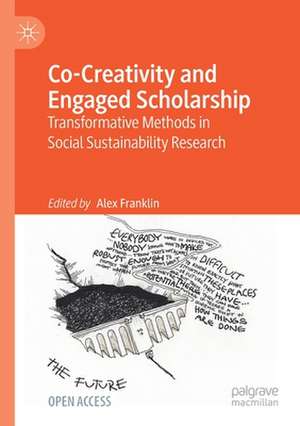Co-Creativity and Engaged Scholarship: Transformative Methods in Social Sustainability Research
Editat de Alex Franklinen Limba Engleză Paperback – 2 dec 2021
This open access book explores creative and collaborative forms of research praxis within the social sustainability sciences. The term co-creativity is used in reference to both individual methods and overarching research approaches. Supported by a series of in-depth examples, the edited collection critically reviews the potential of co-creative research praxis to nurture just and transformative processes of change. Included amongst the individual chapters are first-hand accounts of such as: militant research strategies and guerrilla narrative, decolonial participative approaches, appreciative inquiry and care-ethics, deep-mapping, photo-voice, community-arts, digital participatory mapping, creative workshops and living labs. The collection considers how, through socially inclusive forms of action and reflection, such co-creative methods can be used to stimulate alternative understandings of why and how things are, and how they could be. It provides illustrations of (and problematizes) the use of co-creative methods as overtly disruptive interventions in their own right, and as a means of enriching the transformative potential of transdisciplinary and more traditional forms of social science research inquiry. The positionality of the researcher, together with the emotional and embodied dimensions of engaged scholarship, are threads which run throughout the book. So too does the question of how to communicate sustainability science research in a meaningful way.
| Toate formatele și edițiile | Preț | Express |
|---|---|---|
| Paperback (1) | 284.93 lei 3-5 săpt. | +35.94 lei 7-11 zile |
| Springer International Publishing – 2 dec 2021 | 284.93 lei 3-5 săpt. | +35.94 lei 7-11 zile |
| Hardback (1) | 439.83 lei 6-8 săpt. | |
| Springer International Publishing – 2 dec 2021 | 439.83 lei 6-8 săpt. |
Preț: 284.93 lei
Nou
Puncte Express: 427
Preț estimativ în valută:
54.53€ • 56.33$ • 45.38£
54.53€ • 56.33$ • 45.38£
Carte disponibilă
Livrare economică 04-18 martie
Livrare express 18-22 februarie pentru 45.93 lei
Preluare comenzi: 021 569.72.76
Specificații
ISBN-13: 9783030842505
ISBN-10: 3030842509
Pagini: 388
Ilustrații: XXXI, 559 p. 63 illus., 52 illus. in color.
Dimensiuni: 148 x 210 x 39 mm
Greutate: 0.7 kg
Ediția:1st ed. 2022
Editura: Springer International Publishing
Colecția Palgrave Macmillan
Locul publicării:Cham, Switzerland
ISBN-10: 3030842509
Pagini: 388
Ilustrații: XXXI, 559 p. 63 illus., 52 illus. in color.
Dimensiuni: 148 x 210 x 39 mm
Greutate: 0.7 kg
Ediția:1st ed. 2022
Editura: Springer International Publishing
Colecția Palgrave Macmillan
Locul publicării:Cham, Switzerland
Cuprins
1. Introduction: Sustainability Science as Co-Creative Research Praxis.- 2. Painting Outside the Lines: Transgressing the Managerial University, Avoiding Forced Creativity.- 3. Cooking commoning subjectivities: guerrilla narrative in the Cooperation Birmingham solidarity kitchen.- 4. Participative and decolonial approaches in environmental history.- 5. An Ethos and Practice of Appreciation for Transformative Research: Appreciative Inquiry, Care Ethics, and Creative Method.- 6. Imaginative Leadership: A conceptual frame for the design and facilitation of creative methods and generative engagement.- 7. Insights and inspiration from explorative research into the impacts of a community arts project.- 8. How to nurture ground for arts-based co-creative practice in an invited space: reflections on a community in North Netherlands.- 9. Reflections on doing cross-cultural research through and with visual methods.- 10. The Eye of the Beholder: Applying visual analysis in an historical study oflynxes’ representations in the Bavarian Forest region.- 11. Back to the drawing board: creative mapping methods for inclusion and connection.- 12. ‘Getting deep into things’: Deep mapping in a ‘vacant’ landscape.- 13. Engaging 'future generations' in meaning making through visual methods: an alternative approach to defining city-regions.- 14. Technology as a Tool for Environmental Engagement. The case of Digital Participatory Mapping (DPM).- 15. Living Labs: a creative and collaborative planning approach.- 16. Supporting institutional transformations: experimenting with reflexive and embodied cross-boundary research.- 17. How to make policy makers care about “wicked problems” such as biodiversity loss? – the case of a policy campaign.
Notă biografică
Alex Franklin is an Associate Professor at the Centre for Agroecology, Water & Resilience (CAWR), Coventry University, UK. Her research explores collaborative forms of environmental action and care, with a particular focus on place-based practice, situated knowledge and more-than-human relations.
Textul de pe ultima copertă
This open access book explores creative and collaborative research methods within the social sustainability sciences. The term co-creativity is used in reference to both individual methods and overarching research approaches that, through socially inclusive forms of action and reflection, stimulate alternative understandings of why and how things are, and how they could be. Supported by a wide-ranging series of in-depth—including chapters on militant research and guerrilla narrative, decolonial participative approaches, appreciate inquiry and care-ethics, deep-mapping, photo-voice, community-arts, digital participatory mapping, and living labs—the edited collection critically reviews the potential of creative, collaborative and transdisciplinary forms of research praxis to nurture just and transformative processes of change. This includes considering the role of narrative, creative workshops, visual and arts-based forms of research in contributing to engaged scholarship, as well also as a range of methods from field of critical cartography. The positionality of the researcher, together with the emotional and embodied dimensions of ‘doing’ transdisciplinary research are threads which run throughout the collection. So too does the question of how to communicate sustainability science research in meaningful way.
Caracteristici
A unique overview of transdisciplinary approaches to researching and communicating community environmental practice Demonstrates how to engage in impactful research realising the full potential of transdisciplinary science Invaluable reference for researchers working across a range of different institutions and community settings This book is open access, which means that you have free and unlimited access
